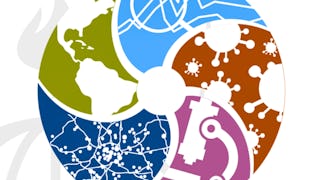![[Featured Image]: Two industrial hygienists are discussing and checking the conditions of the workplace to see if there are hazards that have to be corrected.](https://images.ctfassets.net/wp1lcwdav1p1/1v14IV1cvKhxjaHQQIx5XA/be19f013445a0bdaf69fde5c16bdc28e/GettyImages-1307737353.jpg?w=330&h=216&q=60&fit=fill&f=faces&fm=jpg&fl=progressive)
What Is an Industrial Hygienist and What Do They Do?
Discover how to qualify for industrial hygienist jobs, what the occupational health role is, and the skills needed to become an occupational hygienist.
October 4, 2022
Article
Public health careers make a meaningful impact on community wellness and health policy. Learn more about this important field with our helpful resources.

Learn more about public health

University of Michigan
Skills you'll gain: Community Health, Public Health, Health Disparities, Health Promotion, Health Assessment, Social Determinants Of Health, Epidemiology, Health Policy, Health Systems, Data Collection, Preventative Care
Intermediate · Course · 1 - 4 Weeks

Johns Hopkins University
Skills you'll gain: Epidemiology, Public Health, Data Presentation, Public Health and Disease Prevention, Trend Analysis, Geographic Information Systems, Health Policy, Data Visualization Software, Chronic Diseases, GIS Software, Health Systems, Infectious Diseases, Biostatistics, Risk Analysis, Investigation, Health Care, Health Disparities, Community Health, Data Analysis, Statistics
Beginner · Specialization · 3 - 6 Months

Johns Hopkins University
Skills you'll gain: Training Programs, Education and Training, Smart Goals, Community Health, Train The Trainer, Patient Education And Counseling, Educational Materials, Health Education, Adult Education, Needs Assessment, Planning, Supervision
Beginner · Course · 1 - 3 Months
Public health covers a broad range of skills and careers, from epidemiology to health education to policy development and beyond. On Coursera, you'll find the resources you need to accelerate your career, whether you're just beginning your journey in public health or are prepared to take on more responsibility. Explore public health topics, including:
Yes, there are a wide range of options available for students looking to learn about public health online, from individual courses to master’s degrees. And, as in other areas of study, online education gives you the opportunity to learn remotely from top-ranked schools on a flexible schedule from anywhere in the world.
As the world’s leading online learning platform, Coursera offers the full range of these opportunities to learn about public health. Students can take individual courses such as epidemiology, biostatistics, and global health at a lower price than on-campus alternatives, or free collections of public health courses.
If you want to pursue a Masters in Public Health (MPH) degree, Coursera has options for this too. The Global Master of Public Health degree from Imperial College London and the Master of Public Health degree from the University of Michigan offer opportunities to gain an online education in public health from leading institutions in the field.
Epidemiology courses cover a variety of topics essential for understanding the distribution and determinants of health and diseases in populations. These include the basics of epidemiologic methods, study design, and biostatistics. Learners will explore topics such as disease outbreak investigation, data collection and data analysis, and risk factor identification. Advanced courses might cover areas like molecular epidemiology, advanced biostatistical techniques, and epidemiology of chronic and infectious diseases. Practical exercises and case studies help learners apply these concepts to real-world public health scenarios, enhancing their ability to conduct research and inform public health policy.
Health policy involves the principles that state how healthcare is given and its goals for improvement. It can be based on a state, national, or global level. It can also apply at a clinical and hospital level. Health policies are implemented for the safety and security of the public and can vary between places.
A Master of Public Health (MPH) is a graduate-level degree that focuses on studying public health issues, like community awareness, communicable diseases, violence and prevention, water treatment, mental health, disparities in health care access, social isolation, food security, and healthy nutrition. An MPH is not a research-based or thesis degree. It focuses more on practical applications, like improving the health of a particular population through a career in a field like health care, education, public policy, administration, emergency management, or communications. People who choose to earn an MPH often have the option to choose a specialty, like epidemiology, biostatistics, maternal and child health, nutrition, environmental health, or public health administration.